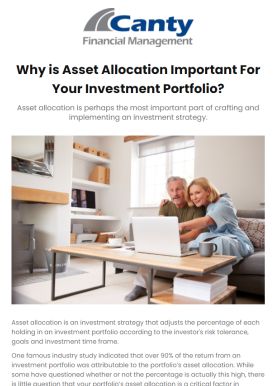
Retirement is a transition in many ways. Your daily routine no longer centers around work. Retirement also represents a time of financial transition as well.
During your working years your focus is generally on accumulating money for retirement. This means contributing to your 401(k), IRAs, taxable investment accounts and others. Your investment strategy may also be a bit more aggressive and geared towards growth.
Once you reach retirement, your investment strategy will generally transition from accumulation to a conservation mode, though this will look different for each retiree depending on their situation. Here are some things to consider as you make this transition.
A key part of your overall retirement planning is determining how much cash you will need to support your desired lifestyle in retirement. Your cash flow needs will play a part in determining how you configure your investment portfolio during retirement.
This includes the basics like your mortgage or rent, the costs of your retirement activities such as travel and a host of other factors.
As you approach retirement, it's important to review your various sources of income in retirement. This will vary from person to person. Retirement income sources might include:
These and other potential sources of retirement income should be reviewed and compared against your projected retirement income needs. This process will go a long way towards determining your investment strategy and the balance between your income needs from your portfolio and the amount invested for growth.
When to claim Social Security is a key component in retirement income planning for many people. The later you claim your benefit, the higher it will be, with a maximum benefit available at age 70. Whether it is best to wait until age 70 to claim your benefit or to claim it earlier is a decision that will depend upon your situation.
For married couples there are a number of factors to consider including any differences in ages or benefit levels between the two spouses. Planning as far as maximizing any potential survivor’s benefits should also come into play.
If you or your spouse are entitled to a pension from your employer, there are generally planning issues here as well. These may include when to begin taking payments for the pension and whether to take monthly payments or opt for a lump-sum rollover if that option is available.
As you look to reconfigure your portfolio to move from the accumulation phase to a conservation phase in retirement, it's important to look at the tax impact of adjusting your portfolio. In taxable accounts this could involve taking capital gains on some holdings if they need to be sold as part of this reconfiguration. In tax deferred retirement accounts, any distribution you take will be considered ordinary income in that tax year.
Tax planning is an important part of your retirement planning and will influence your investing strategy, including withdrawals. Contrary to what many retirees might believe, taxes will continue to be a critical issue in retirement.
Perhaps the biggest financial adjustment as you move into retirement is the balancing act for your investments between reducing downside risk while still retaining enough growth potential so as to not risk outliving your money in retirement.
We will often work with our clients over time to gradually adjust their portfolios towards the right mix between growth and safety that they will need in retirement. This alleviates the need to make drastic portfolio changes when you hit retirement. Drastic changes can often result in a large tax hit for investors.
As far as investment risk, someone in their fifties, sixties or beyond does not have as much time to recover from a major stock market decline, whereas their children in their thirties or forties do. You will need to take your risk tolerance and the ability to absorb investment losses into account in fine-tuning your investment strategy as you move into retirement.
On the other hand, today’s retirees can expect to live 20, 30, or more years in retirement. These longer life expectancies dictate that most investors still need a growth component as part of their portfolio in retirement. For most investors this means an allocation to stocks as part of their portfolio. With the potential impact of inflation, rising health care costs in retirement and other factors it just isn’t reasonable for most investors to take all investment risk off the table.
As you can see the financial transition from the accumulation phase to a more conservation oriented financial strategy in retirement can be complex. There is a lot of planning that needs to be done around your goals for retirement, any desires around estate planning and the level of stable income sources that you have such as a pension or Social Security.
We regularly assist our clients in making this transition. The planning issues, while similar on a macro scale, differ for each person or couple nearing retirement. You need a personalized financial plan and investing strategy crafted for your situation. Additionally, retirement is not a static situation. Your plan and your investing strategy needs to be reviewed and reevaluated periodically. Things change and your financial strategy should keep up with these changes.
We routinely work with our clients to help them make the financial transition from working to retirement. If you are looking for a fee-only fiduciary financial advisor who will always put your interests first, please give us a call to discuss your retirement financial planning strategy or any other financial issues you may have. We are here to help.
Bill Canty, CFP®, CPA
Ed Canty, CFP®
Maureen Walsh, EA, Investment Advisor Rep.
Joe Canty, Investment Advisor Rep.
Tina Alteri, CPA, Tax Advisor

